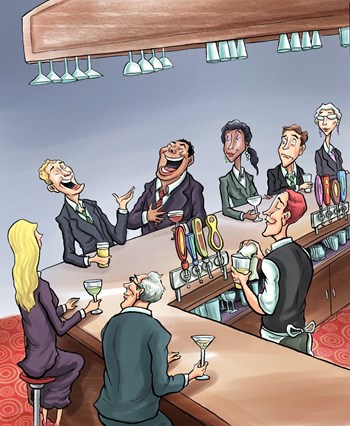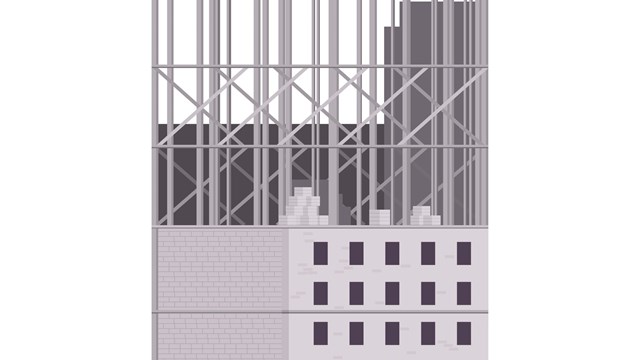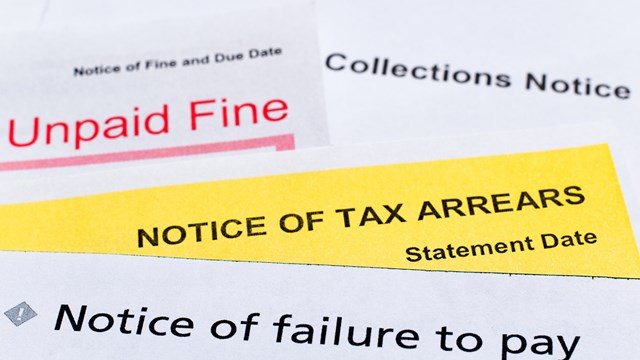
Attorneys who represent co-ops, condos and HOAs in the Garden State often have to litigate cases that have evolved from unforeseen circumstances; they understand the legal boundaries that people in multifamily communities sometimes trespass, and they also understand the political realities under which board-governed communities operate. But until the board wants to fine a resident or kick them out, many people who live in condos and HOAs don’t truly understand the intricacies of living in a shared community that’s full of different, and sometimes disparate, personalities.
Stories of disputes between neighbors over pets, surveillance cameras, foreclosures, unsanitary conditions, perceived threats and other issues can provide cautionary counsel to anyone in a multifamily community. Lawyers who represent these communities have their ear to the ground, and are on alert for the weird, strange, or untenable occurrences that can strain a community.
Dog Bites, Legal Fights
Living in close quarters with others can create situations of conflict, almost as a matter of course. Sometimes problems arise, and a resident hires an attorney to protect his family. Attorney Scott Piekarsky of Piekarsky & Associates LLC in Wyckoff, is currently is litigating a case involving two neighbors whose respective dogs absolutely hated each other. One day, Piekarsky's client opened the front door for a second and her dog charged out and attacked the neighbor’s dog. A day later, the neighbor's dog died from its injuries.
Now, the condo association wants Piekarsky’s client to get rid of her dog. The township is labeling the pet as dangerous, and has warned that if it attacks again, the dog will have to go. The township is requiring the owner to put up a “dangerous dog” sign, which is also a violation of condo rules, Piekarsky says. “The association is sending out communications naming this neighbor as having a dangerous dog, which could be slander.”
The dog case shows many legal issues at play in one case, including community regulations, state law, libel and slander, contract law, and tort law, which governs damages for personal injury, property damage, and loss of chattel. It illustrates how difficult cases involving a pet can be.
“Today, we have this issue of assistance dogs or therapy pets. If a doctor prescribes that dog for a medical reason, such as for a psychiatric reason, it comes before the master deed. Federal law trumps those [community] documents,” Piekarsky says.
Another case of federal law trumping the rules of a community involved a government-funded group home moving into a 280-family, 96-acre New Jersey community, Piekarsky says. “People are now coming to the group home 24 hours a day, potentially changing the character of the community,” he says, but nonetheless the community has no recourse.
Flag Fights
While federal laws are sometimes difficult or impossible to fight, other conflicts in multifamily communities often can be avoided. Some board members can get overly picky about enforcing the community’s rules and inadvertently open a legal hornet’s nest. David Ramsey, an attorney and partner in the Morristown office of Becker & Poliakoff, recalls an incident he handled for a client community years ago. The board banned a resident from flying the U.S. flag outside their home. The board members had been strictly enforcing the rules, which required prior approval for outside displays.
“We cautioned them to be careful, because the American flag is a special exception,” Ramsey says, noting that the case became public in the press and made the community look bad. “Eventually, the board backed down.”
Since that case, the state legislature has cleared up the potential issue by requiring communities to allow residents to fly the flag. But the question of what the community as a whole is responsible for, versus what the individual owner must handle, varies from community to community. State law in New Jersey, though, says a condo owner is responsible for foreseeable criminal harm that could occur on his property. But what’s the reasonable thing to do to ensure safety?
In one tragic case in South Jersey, an older resident with dementia was accusing neighbors of aiming microwaves at him. People in the community became afraid to talk to the man, and the woman in the apartment below him couldn’t stand his ranting and increasingly erratic behavior anymore. She moved out and filed a complaint against him—but on the day of the municipal court hearing on the case, the woman stopped back in the community and was in the parking lot when the old man stabbed her to death.
How does a multifamily community handle residents who are aging and having a hard time taking care of themselves, or who are beginning to represent a danger to themselves or their neighbors? After all, a condo or HOA community is not a hospital or assisted living facility, yet the management of multifamily communities more and more often are being faced with these types of issues. “As the population is aging, we’ll have more of these dementia-type cases,” Ramsey says.
In another sad story, an elderly alcoholic man who lived on his own deteriorated to the point where he was unable to keep up his apartment—or his personal hygiene. Neighbors complained that the stench emanating from his unit had become unbearable, and so the association had the manager hire a cleaning company to scour the man’s apartment. The old man had no relatives, and no one to look after him.
Eventually, the association had to go to court, because even after the cleaning, the man still had problems and wasn’t keeping his apartment clean. The judge ordered that the apartment be cleaned up, and a social worker to be assigned to help the man. Even with the assistance, the older man couldn’t keep it together, and he ultimately had to move to an assisted living facility, Ramsey recalls.
Sticklers Are Costly
While the issues involving residents who flout rules can be vexing, many legal issues arise from board members being too strict. Attorney Henry C. Walentowicz of the law firm of Celentano Stadtmauer & Walentowicz in Clifton, found himself defending his kin after his mother-in-law bought a new townhome. She had her son, a contractor, renovate the townhome and he installed a surveillance camera at the front door, and also a new air conditioning unit.
Shortly after the work was done, the mother-in-law was slapped with a violation notice by the association, which dictated that she remove both the camera and the air conditioning unit. She and her son-in-law fought the violation. In the end, the mother-in-law was fined $1,000 and required to remove the cameras but was allowed to keep the air conditioning unit.
“There’s selective enforcement by boards, sometimes,” Walentowicz says.
What a resident sees happening with a neighbor can be blown out of proportion, or sometimes, the appearance of what is happening can be deceiving. In such scenarios, loving one’s neighbor and being concerned for his welfare can go too far. In one close-knit New Jersey community, a middle-aged woman called the management about an older resident who was her friend. The younger woman was concerned because she hadn’t seen her friend in a while, though the older woman always told her when she was going away for a trip.
Since the community had a small nursing staff, one of the nurses went with a security guard to the older woman’s place. They knocked and rang the doorbell, but no answer. So they let themselves in to check on the resident. “They went up upstairs and out comes the woman from the shower, totally nude,” Ramsey says.
In such a scenario, rather than calling the management, a person should call the police and inform them of your concerns, Ramsey advises. “They’ll decide what’s appropriate or not appropriate,” he says.
Tough Times
Some of the most challenging cases in real estate in New Jersey have occurred recently, or are happening now. For Stephen B. Kotzas, an attorney with Berry Sahradnic Kotzas Riordan & Benson in Toms River, these days are a perilous time, due to the many home foreclosures in the state. There is such a backlog with foreclosures, in Trenton they are 10 years behind, Kotzas says.
“Not only is it hurting other homeowners, it’s impairing collateral, which becomes damaged,” Kotzas says. “There is no procedure to get the person in foreclosure, or to get the bank to pay to common charges on the property.”
HOA’s options are few. Sometimes, if the community can acquire the property for a very low price, it might buy the unit and sell it to a new owner. The community might get a judgment against the homeowner, and rent the home to someone else until the eventual sheriff’s sale of the home. Or, the community might get a judgment against the homeowner, and appoint a receiver. “How important is it for the community to not have vacant or torn-up properties?” Kotzas says.
The problem of unresolved foreclosures is endemic throughout the residential real estate industry. Questions about how to solve this problem abound, but answers are sometimes slow in coming. Many communities are facing the quandary of having liens on a homeowner which exceed the value of the owner’s property. More and more board members are seeing this problem and asking what they can do about it.
Until more legislation or legal remedies address and attempt to correct this problem, the backlog of unsold homes in the real estate market will stay large and partly impede further growth in the market, Kotzas says.
“Smaller associations are getting killed,” Kotzas says. “In a fifteen-unit condo community, for example, if two of the units are in bankruptcy, and one unit is in foreclosure, you’ve got a serious problem.”
Attorney David Byrne, a partner with the law firm of Herrick-Feinstein, with offices in Newark and Princeton, has his own strategy for alleviating these situations. “I convince judges to let me get renters. I’ve come up with a strategy that deals with these situations, where the owner still owns the unit,” Byrne says.
When a condo is considering action on a unit that’s been abandoned or one that has a tenant, the board has rights, and the longer the longer the situation drags out, the greater the HOA’s case is, according to Byrne. “Judges are saying, ‘You know what? A new tenant would be better for everybody,” he says.
Jonathan Barnes is a freelance writer and a frequent contributor to The New Jersey Cooperator.






Leave a Comment